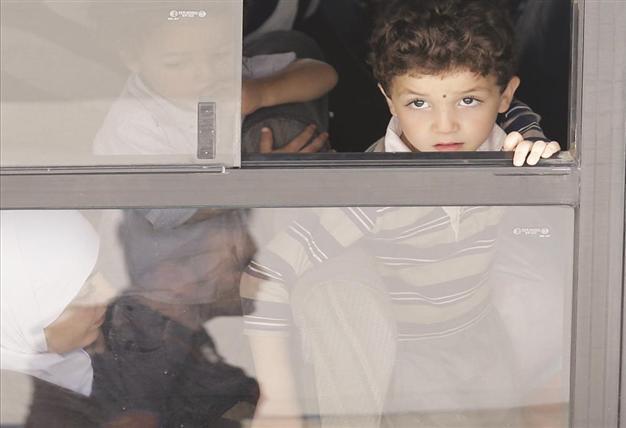Italy disaster highlights Europe’s flawed migration policy
BRUSSELS / ROME

A boy looks out from the window of a bus as he wait to board a ship heading to Sicily. A ship carrying African migrants toward Italy caught fire and capsized off on Oct 4, spilling hundreds of passengers into the sea. AP photo
The deaths of scores of African asylum-seekers off the Italian island of Lampedusa have underlined Europe’s failure to cope with the flood of would-be immigrants knocking at its doors.
Scenes of capsized boats and desperately hungry faces have become commonplace in southern Europe, with 25,000 refugees drowned in the Mediterranean in the last 20 years, according to the International Organization for Migration. Of these, 2,000 died in 2011 and 1,700 last year.
Europe is now bracing for a possible exodus of mind-numbing dimension from the war in Syria, where 2 million people have fled across the borders and millions are internally displaced.
As was the case during the fighting in Libya in 2011, and during the “Arab Spring” protests that unraveled across the Mediterranean, the pressure is on Europe’s sea-washed southern nations – Italy, Malta and Spain, but also economically-battered Greece and Greek Cyprus.
Italy has called for more assistance from the European Union to deal with the sharp increase in refugee numbers, with Interior Minister Angelino Alfano calling the drama “a European tragedy.” The country mourned the 300 African asylum-seekers feared dead on Oct. 4 in the worst ever Mediterranean refugee disaster. Flags flew at half-mast across Italy and schools held a minute of silence for the victims.
As the grim search for bodies off the island of Lampedusa continued, an emotional Pope Francis said Oct. 4 should be “a day of tears” for a “savage world” that ignored the plight of refugees.
Under EU rules, it is up to the nation that is a refugee’s first port of call to consider their request for asylum and to house them in the meantime. Under consistent attack from the EU’s Mediterranean members for its lack of financial and political solidarity from Europe’s north, the system has remained unchanged since its inception in 2003.
There is no mechanism to date enabling an automatic share-out of refugees within the 28-member bloc and calls for a review are systematically knocked down by less affected countries. Meanwhile, asylum conditions differ from one state to the next regarding housing, health or welfare, with the Jesuit Refugee Service denouncing the “inhumanity” of Europe’s asylum system in June.
To prevent tragedies such as Lampedusa, the European Commission has devised a European external border surveillance system known as EUROSUR to pool information on boats believed to be carrying illegal migrants, fight trafficking networks and also help save refugees in distress.
Due to become operational in early December, it has been budgeted at 244 million euros between 2014 and 2020 and is to go to the European Parliament for approval next week. But some EU lawmakers say the system lacks muscle such as providing for more sea patrols in dangerous waters.
‘Italy not prepared’“Italy is not prepared for the surge of migrants on its coasts,” said European Greens co-leader Monica Frassoni.
“The EU as a whole has a responsibility to develop a more humane and robust system.” The EU executive, the European Commission, urged member states on Oct. 3 to kick-start EUROSUR as soon as possible while saying the bloc needed to press ahead with efforts to open new channels for legal migration. In June for instance, the EU signed a “mobility partnership” with Morocco to negotiate a deal facilitating the delivery of visas for students, researchers and business executives.
Its flip side is to also agree to jointly fight trafficking. The commission hopes to sign similar agreements with other countries across the Mediterranean such as Tunisia. “We need sound policies on asylum and migration flows,” said commission spokesman Michele Cercone.
In New York, a U.N. official said the “criminalization of irregular immigration” had played a role in the Lampedusa tragedy. “Treating irregular migrants only by repressive measures would create these tragedies,” said François Crepeau, the U.N. special rapporteur on the human rights of migrants.
He warned that by closing their borders, European countries would only give more power to human traffickers. Instead, he urged the bloc to reinforce opportunities for legal immigration. At talks next week between EU home affairs ministers, the commission is likely to also stress the need to resettle the most vulnerable refugees, notably in line with pleas from the U.N. High Commissioner for Refugees (UNHCR). EU states last year agreed to 102,700 requests for asylum versus 84,300 in 2011. Some two-thirds were registered in four countries, Germany (22,000) followed by Sweden (15,300), Britain (14,600) and France (14,300).
While there are only some 52,000 Syrians registered across Europe at the moment, the trickle is beginning to grow. Italy is among the most affected, with some 3,000 refugees arriving in August alone, according to U.N. refugee agency data.
